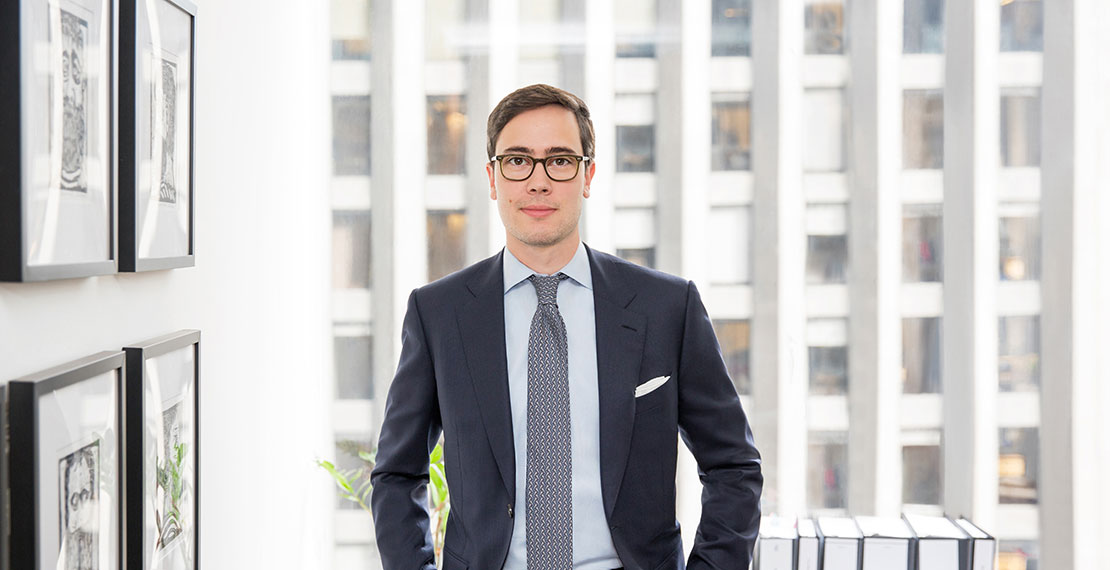In 2018, Ron Krock was working as a BigLaw associate when an announcement in The American Lawyer caught his attention: a group of the country’s best litigators were launching a new firm.
After asking one of the founding partners to meet for coffee—which quickly turned into an interview, and then a callback at the founder's New York apartment—Ron knew he wanted to join Selendy Gay. One year later, he reflects on second-chairing his first trial, squaring off against other prominent adversaries, and why there is life after BigLaw.
How did you first learn about Selendy Gay?
I saw an article in The American Lawyer back in January 2018 announcing the firm’s opening and I was immediately intrigued. I’d heard a lot of great things about the lawyers who’d started the firm, including from their exciting work on the Federal Housing Finance Agency litigation after the 2008 financial crisis.
What made you want to join the firm?
I’m not sure I’d ever given serious thought to life after BigLaw until I heard of Selendy Gay. At the time, I was working at a great firm in New York alongside a terrific group of colleagues.
But I remember showing up for my callback interview at Jennifer and Philippe [Selendy's] home—the firm still weeks away from having an office—and feeling like my perspective had been completely reoriented. The thing I remember most vividly is the excitement: partners on conference calls in the kitchen, holding strategy meetings in the halls, and running back and forth between interviews.
I met most of the partners that day, and got to hear from each of them about their vision for a litigation-only law firm, shorn of corporate conflicts, that works out of a single office in New York; big enough to try any case in any courtroom, but small enough to preserve a sense of community. I was especially struck by the firm’s commitment to training and apprenticeship—the idea that teaching the practice of the law is a prerequisite to building a successful law practice.
Whatever this was, I definitely hadn’t seen it before and I was excited at the idea of helping build it.
What has your first year been like?
I arrived at the firm just a few days after they opened the doors. At that time, we occupied a single corner of a floor, and when the renovation started, the office floors and walls (where they existed) were covered in protective cellophane.
Those first months were intense, but they also turned out to be major growth points for me as a young lawyer. In one instance, I had the chance to take the deposition of a corporate representative in a books and records case, opposite counsel from a prominent New York law firm, while the senior partner sat next to me and gave me substantive feedback during breaks. We won that case not long after, following a one-day trial I had the chance to second-chair. I can’t emphasize enough just how gratifying it was to get that kind of substantive experience so early in my career.
What advice would you give to recent graduates or law clerks who are interested in joining Selendy Gay?
I think most folks will tell you to go to the highest ranked firm that gives you an offer. But this is a hard job that often involves long hours, late nights, and big personalities. You have to ask yourself, if it’s 2 AM and you’re trying to finalize the big brief or punch up the killer cross, who would you rather have in the trenches with you?
Recognizing that fact, the firm places a real premium on cultural fit. It isn’t enough to be a great lawyer—you’ve got to be a great colleague, too. Everyone here is on a first name basis. We celebrate our wins (or even just Wednesdays) with karaoke. We know each other’s spouses, partners, and kids.
The longer I’ve been doing this, the clearer it is to me that who you work with matters as much as (and usually more than) what you work on. We’re fortunate to work at a firm that values both.
How has the firm helped you develop professionally?
At Selendy Gay, training informs every aspect of our practice. The partnership takes an active role in that process, developing robust training programs and teaching us core litigation skills through monthly presentations on substantive and procedural law, and annual writing, deposition, and trial seminars designed to keep litigation skills sharp.
In addition, the firm offers a series of business development workshops where we work with our Chief Marketing Officer to create individualized business plans and practice client pitches. The firm also provides confidential, on-demand consultations with a professional coach to help associates think strategically about case management.
These programs underscore the firm’s commitment to associate development, but more than that, they recognize the valuable role that associates play as business developers and case managers. The firm expects a lot from its associates, but it’s heartening to know that you’re supported at every level.


